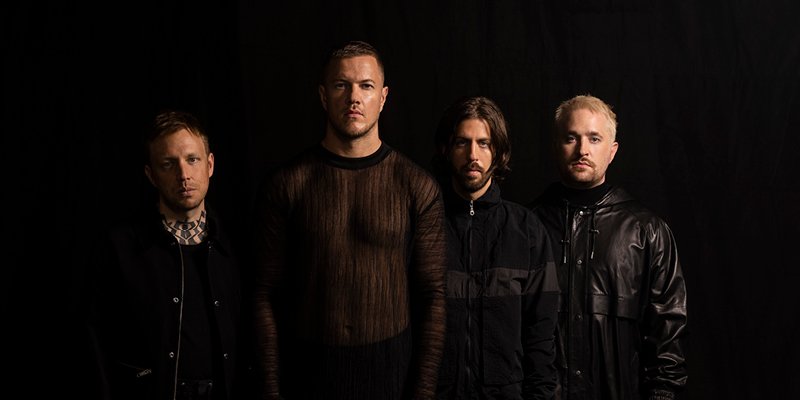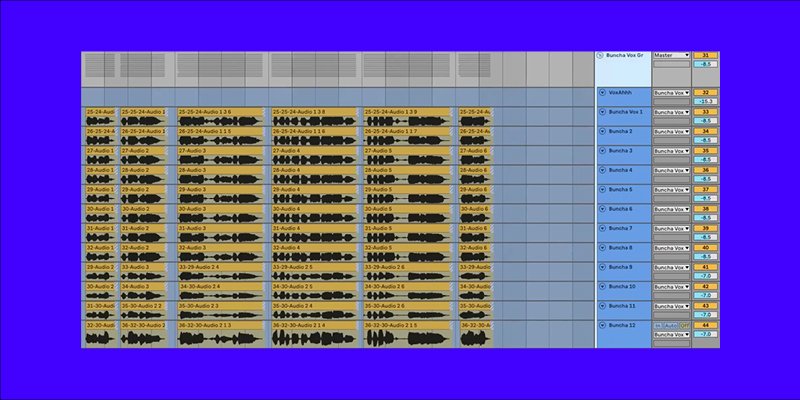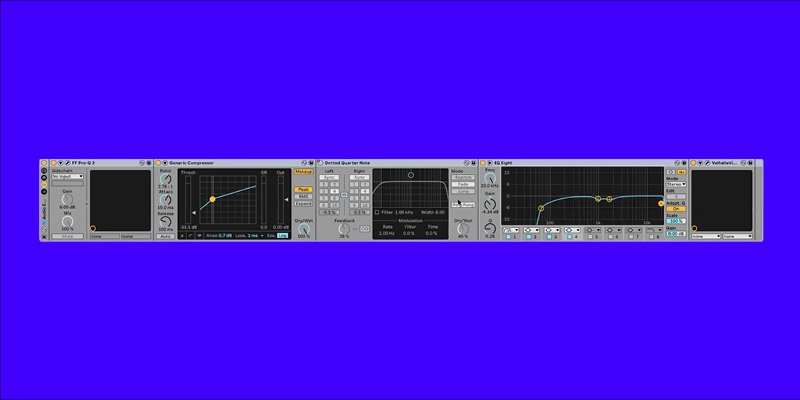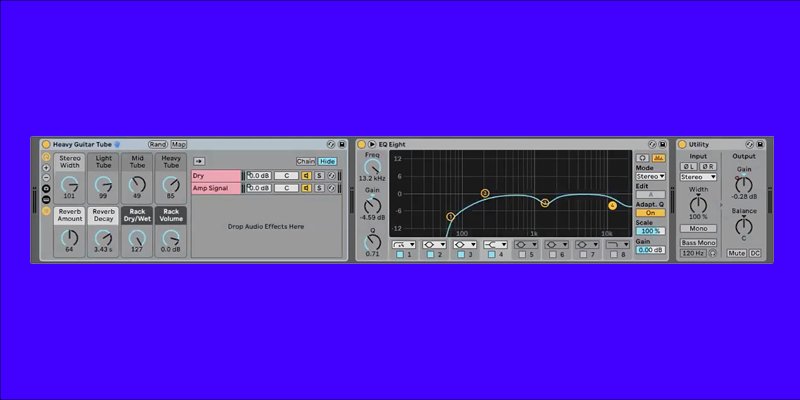- Rock – View posts with tag: Rock
- Guitar & Bass – View posts with tag: Guitar & Bass
- Recording – View posts with tag: Recording
- Songwriting – View posts with tag: Songwriting
- Compressor – View posts with tag: Compressor
- Pop – View posts with tag: Pop
- United States Of America – View posts with tag: United States Of America
- Audio Effect Racks – View posts with tag: Audio Effect Racks
Imagine Dragons: From Home Studio to Shangri-La

The best-selling rock band of the past decade doesn’t rely on a big-budget studio to craft their sound. “I recorded ’Thunder’ in a big room in my house,” says Dan Reynolds, lead singer of Las Vegas quartet Imagine Dragons. “Most of my vocals are recorded in rooms like this. Horrible acoustics. I listen to ‘Thunder’ and I hear my kid yelling in the background. I don’t even know if I told you this, Wayne.”
“Oh I know because I tried to fix it,” replies Wayne Sermon, the band’s lead guitarist and, along with Reynolds, one of the band’s primary songwriters. “During all those moments where I get these vocals and there'd be so much noise, the purist in me is like, this is a huge problem. But I listened to the song and the song sounded great.”
Imagine Dragons - Thunder
That willingness to reject convention has underpinned the success of Imagine Dragons throughout their career. The band’s core group of instrumentalists – Sermon, bassist Ben McKee, and drummer Daniel Platzman – are trained jazz musicians and graduates of Berklee College of Music. Their breakout success came with their album Night Visions, executive produced by hip-hop producer Alex da Kid. Over the next 10 years, they would craft a sound with Alex that would marry their love of hip-hop with contemporary trends in American electronic music to help them dominate the Billboard charts and catapult them to stages everywhere from the Super Bowl to the Champions League. Ostensibly labelled as an alternative rock band (Wayne clarifies: “I’ve always seen us as more of a collective of music makers and producers”), the group whole-heartedly embraces the studio as an instrument, with much of their sound owing to their expertise of production techniques using Ableton Live.
On their latest album, Mercury - Act1, Dragons enlisted the help of reducer-extraordinaire Rick Rubin to challenge the band’s songwriting at his historic Shangri-La studio in Malibu. Dan and Wayne spoke with us about the creation of their new album, from sketching in their home studios to shaping the final product with Rubin. Along the way, they walk us through the Live Set for the album’s lead single “Wrecked”, produced entirely in Ableton Live.
For each of you, what is your typical starting point when writing a song?
Dan: I typically get on and I have no idea what I'm going to do at any given moment. I never have lyrics written. I've never had a poetry book or anything like that. I'll just scroll through tons of sounds. I might pull up a piano keyboard and play around with chords until I think something strikes a chord with me (no pun intended). And then I will say, "Oh, wow, this is how I'm feeling." It's always feel. I feel happy. I feel somber. I feel dancey, I feel angry. It's always from an emotional place for me.
So, then I'll sit down and start to create some sort of soundscape. Maybe it's a rhythm, maybe it's a chord progression. And the melody will come to me as I'm creating that. And then it’s about how quickly I can get that out. The faster I can get out of my head onto the paper, the better it is for me. So I don't want anything in my way. I don't want any interruptions. I don't want anything that slows me down. I just want to get this out of my head because it's a very rewarding process for me for no reason. I've written thousands of songs at this point that nobody hears. I'm writing it really for myself. And then I'll express it as quickly as I can. It usually takes me a few hours - maybe six hours - but I typically don't ever let a song go past a day to be finished in a demo format. I can't.
Wayne: My sketches start in Ableton too. I'll start with something simple – a guitar idea, some loop or something – and then build on it. It's usually pretty empty when I send it to Dan because you don't want to fill it out too much before a singer gets his voice on it. I remember Alex, our label president, our first producer, being like, “‘Love the Way You Lie’ was me on a hundred-dollar guitar with a hundred-dollar mic and the Mbox. And that was good enough for Eminem and Rihanna.” So basically, if it sounds right, it is right. I've learned that more and more over the years. As much as I still love gear, that's always the driving force: how does it sound?
I love that. I think it's such an important message because it’s so easy for people to get caught up thinking they need thousands of dollars of studio equipment when, like you said, 100 bucks might be all you need to get to number one.
Dan, I listened to your Song Exploder episode, and you mentioned that a lot of your demo vocals end up making it on the finished album. What is your approach to recording vocals at home?
Dan: More often than not, the vocal that I do on the first take is typically the vocal that we use. I'll get into a studio sometimes and if we're like, "OK, we need to rework the song,” then, yeah, I'll re-sing it. But, typically, I really hate to redo the vocal. I really am so based on feeling it when I'm recording. The pitch could be bad, the microphone could be bad. But if the character, if the energy, if the emotion in the vocal is there, I find that's what matters the most.
Typically, my vocal chain is just what’s built-in from Ableton. I recorded "Thunder" in a big room in my house. Most of my vocals are recorded in rooms like this. Horrible acoustics. Like when I put the compressor on it, it's grabbing the entire room and compressing the entire room vocal. But it's weird and it's cool and I liked it. And we'd try to redo it in the vocal booth and it just sounded dead and quiet and there was no vibe to it at all. And those things matter. How much do they matter? I don't know, but I think they matter. I attest a lot of our success to this formula: if it ain't broke, it ain't broke.
Wayne: I have a song pulled up from the latest album called “Wrecked". Dan made the song and sent it to us. We loved it. Then we proceeded to try and do this song six different ways. I think the name of this is "'Wrecked 6.6." We tried it at Rick Rubin's, we tried it on our own at our drummer’s studio, we tried it so many different ways. And this is one where it was like, go back to the demo. There was something about that original demo that was special. We did add some things here and there and replace some stuff, but, for the most part, this is how Dan wrote it that day.
Imagine Dragons - Wrecked
Dan: So the basics of this were, I started with Kontakt and played around with the guitars in there, which Wayne ended up beating. We used real guitars. That helped a lot. [I used] the Rickenbacker bass from Kontakt as well. Our bass player tried to beat it and didn't beat it. So we stuck with the Rickenbacker plugin, which I find to be an incredible bass. I can't tell you how many producers I met with who use that Rickenbacker bass.
So I've seen a lot of people be like, "Oh, Imagine Dragons sounds like an army of ten thousand people in the chorus.”

Wayne: Let me tell you, Dan is the master of stacking. I hardly ever nudge anything. And there's like 12 tracks here. It's pretty amazing. It's one of his few talents.
Dan: I really love the sound. So for the “Wrecked" chorus, we had this huge stack and it sounded great and we overthought it because everybody's always like, "well, Imagine Dragons chorus, it's got so many voices….” And we're like, this is a new record, let's step back and let's not do a stacked vocal for this chorus, even though it feels really great. Let's do one vocal. And so I tried to do one vocal.
Wayne: So here's the single vocal take:
And this is what we ended up with:
So yeah, that's the demo. That's the first iteration of it. And it sounds amazing.
Is each one of these an individual take or are some of these duplicated?
Dan: They're all individual takes.
Wayne: So first, this is what effects are on pretty much everything he does: a Q-3 with the dynamic EQ engaged and the “Generic Compressor” [preset]. He always uses “Generic Compressor”.

Dan: I love that. I don't know why it's called the “Generic”, it should be called the “God Compressor” because that thing is amazing.
Wayne: Then there's some delay that's been automated in certain parts to come on and off toward the end of phrases, and then another EQ here, and then the Valhalla Reverb.
And is this a [Valhalla] preset?
Wayne: This is how it is when you open it and he just messes with the mix. It sounds amazing when you just open it, honestly.
Dan: Yeah, I literally just opened it. I think I turned down the decay and turned down the mix, and that's probably it.
Wayne: One of my favorite parts about this song is the guitars. Dan has this thing he does. He did it first on "Thunder," I believe, where he makes his voice sound like a guitar. And a lot of times people can't tell the difference between whether it's a guitar or his voice. He did it on this song for this part. He does this heavy guitar tube preset:

Wayne: And this is without the effect:
Wayne: I think the thing about the human voice is it's capable of so much emotion. I mean, I love guitar. It's my main instrument. But a voice can capture something that I think sometimes any other instrument can't, so there's all that nuance that guitarists kind of wish they could get out of their instruments, and it's so easy to do with the human voice. I think it worked really well for the song.
It comes back to what sounds right. There's no ego involved. It doesn't matter what it is. Is it great? Then that's what it is. I did those guitars so many times. I wanted to beat the MIDI guitars Dan had on there because I thought I could. I tried like five different times. I tried it at Rick Rubin's studio. I tried it at our drummer's studio with all the amps and the fancy gear and like, I just was so upset that I couldn't get it. So I just came back to my house and did two instances of Guitar Rig and it sounded better than everything else I tried, so I just stuck with it. I think it sounds great. But, you know, whatever.
Are there ever any moments when you guys feel “purist” about things? Like, “no, we absolutely have to have live drums on this, we absolutely have to have a live bass on this?”
Dan: You know, I would say absolutely there's no purism to Imagine Dragons. When we had that notion, when it existed in the first year of creating a record, we immediately threw it out the window. It was like, it will be the death of us. And again, I can only speak for what has worked for us, what is right for us. Our mentality is “is it right for you as an artist?” I think the second you compromise that, then you're in trouble. Then you're not going to have success. I really think success comes from an artist knowing who they are, doing what they love and just doing it no matter what and not thinking about purism or critical voices or anything else.
Going back to the album, how do you approach taking these song ideas that you have and developing them from sketches into more refined songs? For example, I saw the behind-the-scenes video of when you all were recording "Cutthroat". I was fascinated by the creative process of incorporating feedback from Rick Rubin. For that song and for other songs on the album, how do you approach tackling feedback from an executive producer? What does that process look like?
Wayne: Yeah, "Cutthroat" was really a tricky one. We tried that one a lot of different ways too. The original demo that our drummer sent in was a lot more guitar based, more rock in the traditional sense.
Dan: Western rock, or something.
Wayne: But “Cutthroat” I think came together for us in Rick's studio. When we got on the piano and finally started slamming down those low notes, that’s when we're like, “OK, this is a more hip-hop direction, more sparse, more choosy with the sounds you have.” And Rick had a really cool modular synth that we used to run Dan's vocal through a bunch of effects.
So that ended up being the backbone of the song, these big moments with a lot of space in between, which I think is really smart and new for us because we tend to like walls of sound. And, you know, "If you want something big, you gotta have a lot of tracks and make it big." But this is big by reducing things down to the necessary ingredients. So it was a smart learning experience for all of us in the band working with Rick.
Dan: Rick made us play every song with an acoustic guitar. Either it sounded good on acoustic guitar or suddenly it didn't sound good anymore and we were like, “OK, I guess that song was just about the production.” And if it's just about the production then, “OK, I guess it doesn't make the record.” There are a lot of songs that we were going to record that didn't make the record because it didn't pass the Rick Rubin guitar and vocal test.
Dan, I know that throughout Dragon's catalog, you've dealt with personal topics in your lyrics. But I think on this last album, you really hit a level of honesty that I don't think people have heard from you before. How do you approach exposing yourself emotionally when working with people outside of the band, like executive producers, songwriters, or session players? How do you go about letting yourself get to that vulnerable place with people who you might not be familiar with?
Dan: I think what has helped me the most is, first of all, we've always kept a really small circle. So the writing process is always in the way that I've explained to you. I write something on my computer or the guys will send me something. I've been with them for so long that they know me. They know my issues, they know my good things, they know when I'm not happy, they know it all, so I'm not afraid of them hearing things.
When a producer comes into the room, for sure, it takes me a minute. Rick was like, “OK, print out all the words on paper and we're going to go through every word.” And we did that. And that was hard for me because there were moments that Rick would question and be like, "well, that kind of sounds corny” or “what did you mean when you said this?” And I'm like, “well, I don't really know. it just kind of felt good.” And he's like, “nah, I don't think it feels good.”
Wayne: Rick was a very hands on, approachable, very involved and concerned producer. It was incredible. I remember we were showing him a demo and we were flying like 80 tracks of a demo in Ableton into Pro Tools and then Rick was going to listen to the song and maybe subtract or add some stuff to it from the demo. When the engineer pulled it over to Pro Tools, for some reason, one pad in this stack of tracks got moved by an eighth note. And so we're listening to the track and it comes to this part, and Rick was like, “Stop, stop, stop.” So he stops the song, and he's like, “Why is that weird there? Something's going on there you need to look at.” And as we looked at it, lo and behold, there's an eighth note nudge on this pad that he heard and recognized. It was his first time hearing the song! So that's when I was like, OK, Rick's the deal. I'm a believer in this Rick Rubin thing. He's got the mojo.
That’s incredible. I have one last question: if you were to encounter someone who's maybe just starting out pursuing their music career, what would you want to say to them? What kind of advice would you want to give them, if any?
Wayne: I don't know the exact path because things are changing so quickly right now. But all I know is that the people who are destined to do music - and will do music - aren't going to listen to my advice anyway. They're just going to do it. The people who are going to be successful, they're going to do it because they have to do it, not because they want to do it. There's going to be easier ways to make money, I assume. They're going to carve their own path somehow and do it despite established musicians telling them what to do or what not to do. There's just this fire you see in people that are going to do it despite the odds. And I wish them all the best doing that.
Keep up with Imagine Dragons on their website
Text and interview by Daniel Krishnan. Daniel is the founder of Program Change, a media platform dedicated to inspiring music-makers around the world.